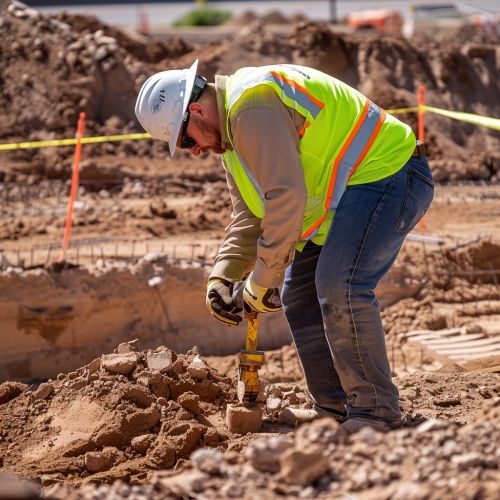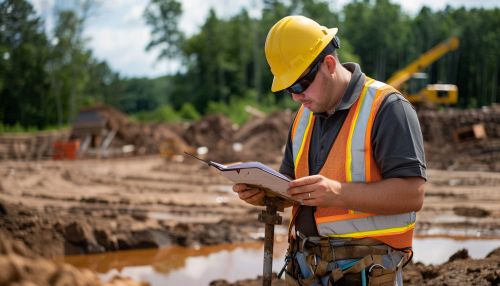Geotechnical Investigation
Introduction
Geotechnical investigation is a specialized area of civil engineering that involves the study of the behavior of earth materials. This field is crucial in the design and construction of foundations for structures, as well as in the design of earthworks such as dams, embankments, tunnels, and levees.


Principles of Geotechnical Investigation
The principles of geotechnical investigation are rooted in the understanding of the properties and behavior of soil and rock. This includes the study of soil mechanics, rock mechanics, and the interaction between structures and the ground. The primary goal of a geotechnical investigation is to provide data that can be used to design safe and efficient foundations for structures.
Soil Mechanics
Soil mechanics is a branch of geotechnical engineering that focuses on the behavior of soils under different conditions. It involves the study of soil composition, structure, and properties, including its strength, elasticity, and permeability. Soil mechanics also involves the study of soil behavior under different loading conditions, such as the application of pressure or the presence of water.
Rock Mechanics
Rock mechanics, on the other hand, is the study of the properties and behavior of rocks. It involves understanding the stress-strain relationships in rocks, the propagation of waves through rocks, and the stability of rock slopes and tunnels. Rock mechanics is crucial in the design of foundations for structures built on or within rock, as well as in the design of rock structures such as tunnels and dams.
Methods of Geotechnical Investigation
There are several methods used in geotechnical investigation, each with its own advantages and limitations. These methods include field testing, laboratory testing, and geophysical testing.
Field Testing
Field testing involves the collection of soil and rock samples from the site and the performance of in-situ tests. Common field tests include the Standard Penetration Test (SPT), the Cone Penetration Test (CPT), and the vane shear test. These tests provide information about the strength, density, and other properties of the soil or rock at the site.
Laboratory Testing
Laboratory testing involves the analysis of soil and rock samples in a controlled environment. This can include tests to determine the soil's grain size distribution, Atterberg limits, compaction characteristics, and shear strength, among others. Laboratory tests provide more precise data than field tests, but they are also more time-consuming and costly.
Geophysical Testing
Geophysical testing involves the use of non-invasive methods to determine the properties of the soil or rock. These methods can include seismic testing, resistivity testing, and ground penetrating radar. Geophysical tests can provide a continuous profile of the subsurface conditions, but they are less precise than field and laboratory tests.
Applications of Geotechnical Investigation
Geotechnical investigation is used in a wide range of applications, including the design of foundations for buildings and bridges, the design of earthworks and retaining structures, and the assessment of slope stability and soil liquefaction potential.
Foundation Design
In the design of foundations, geotechnical investigation provides the data needed to determine the type and size of foundation that will provide adequate support for the structure. This can include the design of shallow foundations, such as footings and rafts, or deep foundations, such as piles and caissons.
Earthworks and Retaining Structures
In the design of earthworks and retaining structures, geotechnical investigation provides the data needed to determine the stability of the soil or rock and the design parameters for the structure. This can include the design of embankments, dams, tunnels, and retaining walls.
Slope Stability and Soil Liquefaction
In the assessment of slope stability and soil liquefaction potential, geotechnical investigation provides the data needed to determine the risk of slope failure or soil liquefaction. This is crucial in areas prone to landslides or earthquakes.
Conclusion
Geotechnical investigation is a critical component of civil engineering that provides the data needed to design safe and efficient structures. By understanding the properties and behavior of soil and rock, engineers can design foundations, earthworks, and retaining structures that are safe, efficient, and durable.
